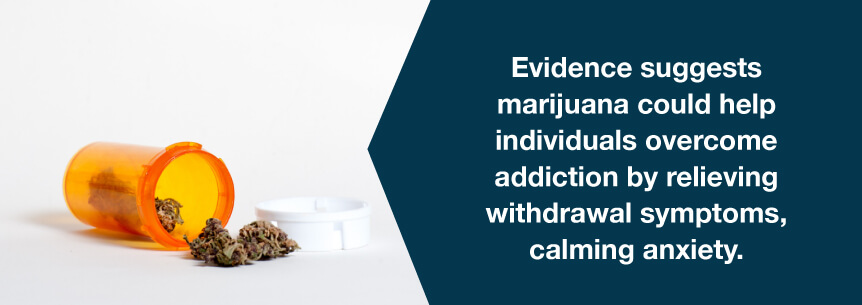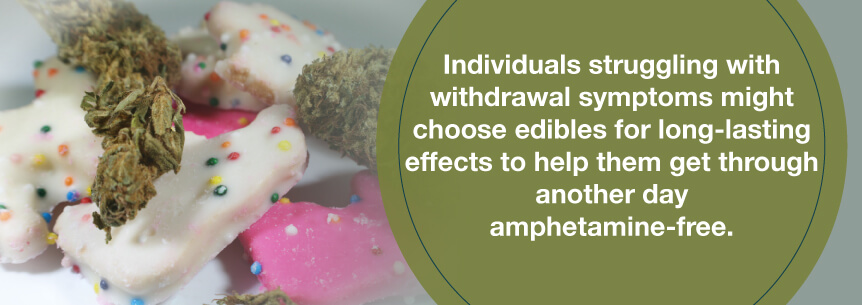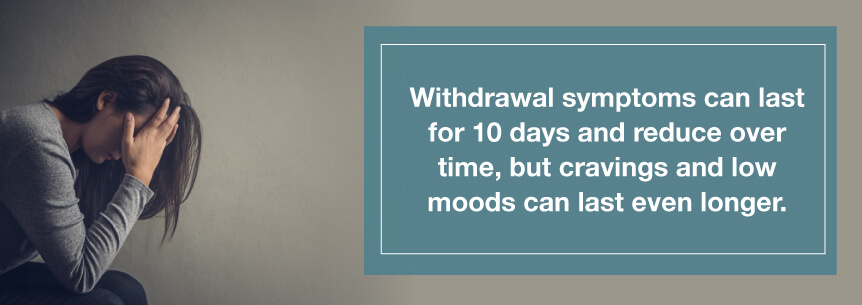Amphetamines are stimulating drugs people can get with a doctor’s prescription or obtain illegally. Doctors prescribe some amphetamines, such as Ritalin, to treat attention deficit hyperactivity disorder (ADHD). A doctor may also prescribe amphetamines to treat obesity or narcolepsy. Here are the most common prescription amphetamines and their brand names.
Some individuals buy and consume amphetamines illegally. The Drug Enforcement Administration classifies amphetamine as a Schedule II stimulant, which means it has a high potential for abuse. Amphetamines may come in the form of a pill or powder. Users take amphetamines to boost their energy and confidence or to experience a sense of well-being.
There are different types of amphetamines, but they all speed up the body’s processes and have similar effects to cocaine. Common amphetamines and their street names are as follows.
According to the 2016 National Survey on Drug Use and Health, an estimated 1.7 million Americans aged 12 or older misuse stimulants. An estimated 648,000 people aged 12 or older have a methamphetamine use disorder.
Chronic stimulant abuse can lead to psychosis, hallucinations, skin sores and an obsession with one’s thoughts. Users also face the risk of a fatal overdose. However, despite the harmful effects of amphetamine abuse, many users struggle to quit the drug. When they try to stop using amphetamines, they experience unpleasant withdrawal symptoms such as depression, irritability and intense cravings. To end the discomfort of withdrawal, they continue to use.
Fortunately, there is hope for individuals suffering from amphetamine addiction, and medical cannabis may be the answer. Medical marijuana can treat many conditions, from depression to opioid addiction, and can ease withdrawal symptoms when other medications provide no relief. At this time, there is no medication to cure an amphetamine addiction, which is more reason researchers should further examine the healing properties of marijuana. In this piece, we will explore amphetamine dependency treatment and why doctors and patients should consider medical cannabis as an effective medicine for a successful recovery.
Evidence suggests marijuana could help individuals overcome addiction by relieving withdrawal symptoms, calming anxiety and providing a safer alternative to dangerous and potentially fatal drugs like amphetamines.
Find A Doctor Find A Dispensary

For example, according to a 2013 psychiatry article, the endocannabinoid system is involved in the neurobiological processes related to stimulant addiction. Cannabinoids, or the chemicals in the marijuana plant, can target the same reward system stimulants affect. In other words, medical marijuana could replace more dangerous drugs.
Also in this article, the authors referenced a study in which 25 crack cocaine addicts smoked cannabis to relieve withdrawal symptoms. Of these individuals, 68 percent stopped using crack during the nine-month-long study.
A Canadian study also investigated the intentional use of marijuana to reduce crack cocaine use among study participants. The researchers concluded there is a link between deliberate cannabis use and decreased crack use.
Lastly, a study in the Harm Reduction Journal found patients with drug abuse issues or alcoholism use marijuana as an alternative for harder drugs like cocaine. Researchers suggest marijuana is an effective treatment, or at least a safer alternative to amphetamines. You cannot overdose on marijuana, but you can overdose on amphetamines.
Marijuana interacts with the human endocannabinoid system and activates cannabinoid receptors in the brain and other tissues. Cannabinoid receptors help regulate functions such as pain perception, mood, appetite and memory. With marijuana medication, scientists can target these receptors and treat a wide range of conditions, including drug addiction.
Medical cannabis helps relieve a vast array of symptoms resulting from different health conditions, including withdrawal from amphetamine addiction. Individuals can gain control of their lives and health with a treatment plan, behavioral therapy and marijuana medication. Cannabis can treat the following withdrawal symptoms relating to amphetamine dependency:
Marijuana can also increase appetite in individuals who have struggled to eat while addicted to amphetamines. Finally, cannabis helps regulate blood pressure to counter the effects of stimulants.
A study published in 2014 found marijuana reduces brain damage associated with methamphetamine use, suggesting medical cannabis might help individuals experience less harm while using methamphetamines if they struggle with abstinence.
There are three basic types of medical cannabis — Indica, Sativa and hybrids. Each strain has unique qualities and effects on the individual. Those who want to seek help for an amphetamine addiction should speak with a marijuana-certified doctor to determine the best strain for their condition and lifestyle. A doctor may recommend an Indica strain for the following purposes:
Some patients might benefit more from a Sativa strain. For example, a doctor might recommend Sativa to replace the energizing effects of stimulants and prevent a patient from feeling depressed. Patients commonly experience low moods resulting from amphetamine withdrawal. Instead of reaching for a stimulant drug, they might opt for a safer alternative — cannabis. The Sativa strain could help a patient:
Sativa strains treat depression and ADHD and could be a replacement for harmful and addictive amphetamines. Hybrid strains contain characteristics of both Sativa and Indica plants.
A certified doctor will recommend the best method of medical cannabis ingestion for the patient’s current condition. For example, if a patient is vulnerable to throat and lung irritation, it would be healthiest for them to avoid smoking marijuana. With that said, it is essential for the individual to choose a method they are comfortable with. Individuals struggling with amphetamine addiction might consider the following methods of marijuana consumption.

Other common methods of cannabis ingestion include:
Consuming medical cannabis for amphetamine dependency may result in side effects. However, these are mild compared to the effects of amphetamine abuse, and they depend on the dosage amount, the current health condition of the user, and the type of strain consumed. A physician will discuss the pros and cons of medical marijuana treatment to help patients determine the best strain and dose for minimal side effects. Some common side effects of medical cannabis include:
To reduce the chance of experiencing side effects, patients should always follow doctor recommendations. Similarly, patients should consider the time of day when taking their medication. For example, taking a Sativa strain before bed might keep a patient awake. Likewise, ingesting Indica in the middle of the day could make a patient tired when they do not want to sleep.
If you or a loved one struggle with amphetamine dependency, you might consider medical marijuana as an effective treatment. Overcoming addiction is not easy, and it is normal to experience uncomfortable withdrawal symptoms that might prevent a successful recovery. Medical cannabis can relieve many different symptoms and get you on the path to improved health and happiness. A certified cannabis doctor can examine your condition and determine if medical marijuana for amphetamine dependency is the right treatment for you.
To get started on your journey toward healing, use our extensive network to connect with a qualified marijuana doctor or locate a nearby dispensary. To stay on top of the latest medical cannabis news, sign up for our free monthly newsletter today!
Find A Doctor Find A Dispensary
In the 1930s, amphetamines were available as over-the-counter inhalers to treat nasal congestion. By 1937, consumers could get amphetamines in pill form to treat narcolepsy and ADHD. Now, some people manufacture amphetamines illegally in private laboratories, allowing individuals to abuse amphetamines without a prescription.
Those who take prescription amphetamines may build a tolerance to the drug over time, and could experience withdrawal symptoms just as someone who abuses the drug illicitly. A user may become dependent on the drug and feel unable to function without it. After using amphetamines every day over time, the body develops a tolerance to the drug and requires a higher dose to feel the desired effects.
Prescription stimulants increase dopamine and norepinephrine in the brain. Dopamine affects the sensation of pleasure and pain, and norepinephrine affects heart rate and blood pressure. Amphetamines make a person feel energized, increase their confidence, heighten their awareness, boost concentration and make them more outgoing. However, amphetamines also speed up heart rate, which could lead to a heart attack. Long-term use might cause skin sores, insomnia, weight loss, tooth decay and heart problems.
An individual may have an amphetamine dependency if they:
Individuals who are dependent on amphetamines struggle to cease use and continue to use the drug to avoid withdrawal symptoms. Once a person stops using amphetamines, they may experience the following withdrawal symptoms:

Withdrawal symptoms can last for 10 days and reduce over time, but cravings and low moods can last even longer. Long-term dependency on amphetamines could lead to an overdose as users increase the amount they consume to meet a higher tolerance. It could also lead to:
There are no known medications for amphetamine dependency treatment. Individuals seeking treatment for amphetamine addiction typically get help in an outpatient setting. Depending on the severity of their condition, some individuals may join an inpatient program. Treatment for amphetamine dependency usually involves:
Treatment for amphetamine abuse mainly involves understanding why the individual turned to amphetamines in the first place. Individuals also learn healthy ways to cope with cravings.
Data from the Cochrane database shows the antidepressant fluoxetine, better known as Prozac, may decrease amphetamine cravings in the short term. Likewise, imipramine may help individuals stick to medium-term treatment plans. However, the benefits are very limited and provide evidence that no treatment exists for amphetamine dependence. If an individual decides to try fluoxetine for addiction treatment, they may experience the following side effects:

Like fluoxetine, doctors often use imipramine to treat depression. Possible side effects include:


Please allow us to access your location to find local dispensaries.
VIEW ALL DISPENSARIES ➔